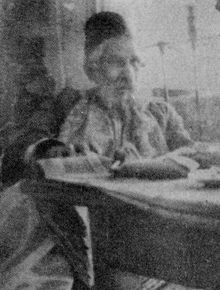Solomon Eliezer Alfandari
| Rabbi Solomon Eliezer Alfandari | |
|---|---|
 |
|
| Position | Rosh yeshiva, Constantinople Chief Rabbi of Damascus, Ottoman Syria Chief Rabbi of Safed |
| Personal details | |
| Born |
c. 1826 Constantinople, Ottoman Empire |
| Died | 22 Iyar 1930 (aged about 104) Jerusalem, Mandatory Palestine |
| Parents | Yaakov and Chana Alfandari |
Solomon Eliezer Alfandari (Hebrew: שלמה אליעזר אלפנדרי) (c. 1826 – 1930), also known as the Saba Kadisha ("Holy Grandfather"), was a distinguished rabbi, kabbalist and rosh yeshiva in his native home of Constantinople, and later served as Chief Rabbi of Damascus, Syria Vilayet, and Safed, Beirut Vilayet. He was known for his stringent interpretation of halakha and his uncompromising dedication to Orthodox Judaism.
The Saba Kadisha was born in Ottoman-controlled Constantinople around 1826 (some say as early as 1820) to a distinguished family of Torah scholars. His father, Yaakov, was a Talmudic scholar; his grandfather, Rabbi Ḥayyim ben Yaakov Alfandari, authored Maggid MiReishit, and his great-grandfather, Rabbi Yaakov ben Ḥayyim Alfandari, authored Mutzal MiEish. His mother, Chana, also came from an illustrious family.
As a youth, Solomon Eliezer was noted for his sharp understanding of Torah subjects. Yet he refused to accept a rabbinical position or to wear the customary dress of the city's sages. He did agree to join the Vaad Haruchani (Spiritual Council) of Constantinople, and accepted the position of rosh yeshiva in a yeshiva which the city's Jews founded for him. In the latter post, he taught many outstanding scholars, including Rabbi Chaim Hezekiah Medini, later known as the Sdei Chemed.
Rabbi Solomon Eliezer displayed his willingness to take a firm stand in a highly charged political situation which found him challenging the views of his entire community.
The issue at hand was the drafting of Jewish soldiers into the sultan's army, a decree fraught with spiritual peril. Originally, the Jews who had fled the Spanish Inquisition to the Ottoman Empire were exempted from the army by the sultan. In Rabbi Solomon Eliezer's day, however, a new sultan, Abdul Hamid II, decreed that all non-Muslims must enlist.
...
Wikipedia
